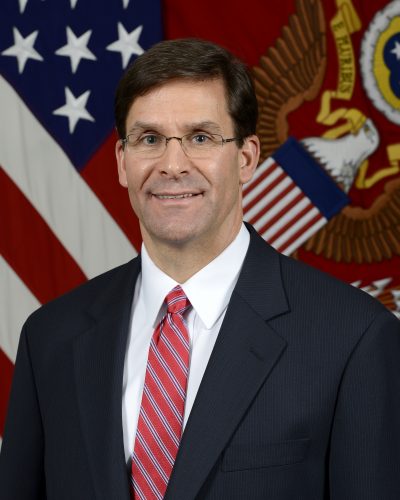US Defense Secretary Mark Esper’s Search for “A Normal Country”. Beware of Russia and China Attempts to “Disrupt the International Order”
Esper’s veneration of what he calls “normalcy” is vapid, but it is still amenable to ideological analysis

In delivering his first major policy-speech since being sworn in as US Defense Secretary in July, Mark Esper said in London on September 6th that the United States’ European allies needed to be wary of developing closer ties with China.
“The more dependent a country becomes on Chinese investment and trade, the more susceptible they are to coercion and retribution when they act outside of Beijing’s wishes,” he said.
Defense Secretary Esper also criticized what he called Russia’s “annexation” of Crimea, alleged Russian violations of arms-control agreements, and said that Russian missiles deployed within range of Western Europe were “probably nuclear-tipped.” He argued that the western alliance needed to do more to counteract what he saw as Russian and Chinese attempts to “disrupt the international order,” and also said that the Trump administration was determined to maintain economic “maximum pressure” on Iran.
Speaking in Paris the following day, Esper said that it would be great if the west could get Russia “to behave like a more normal country.”
One of the reasons why it has become standard practice for US government officials to put their rapid-fire word-salad together so loaded with vapid ideological signifiers is that they are perfectly well aware of Brandolini’s law, and milk it shamelessly.
However, aside from demonstrating their absurdity, we can still analyze Defense Secretary Esper’s remarks on two distinct levels – the first level purely tactical and political, and the second level more abstractly ideological.
What precisely is the point of the US Defense Secretary reiterating the same shopping-list of US foreign-policy and security-policy objectives using the same vapid rhetoric? Or, to ask that question in another way, who precisely were the intended addressees of his remarks?
His audiences in London and Paris had heard it all before ad nauseam. So who precisely was he actually attempting to persuade?
Firstly, quite obviously, he was addressing the grey cardinals who are his de facto superiors. One of the core purposes of the first major policy-speech given by any new US Defense Secretary is to demonstrate that he’s “a team-player.” So it’s best to just double-down on the same old exhausted, vapid rhetoric as un-ironically as you possibly can. Let’s call it the “Emperor’s New Clothes” political imperative.
Secondly, Esper’s speeches in both London and Paris are deliberately worded to appeal to the most naïve segments of the population. In the Occident, pre-pubescent children are now the primary addressees of political speeches. This point partially overlaps with my previous point about Brandolini’s law. In any case, if I attempt to persuade an adult of anything, then I will likely have to construct arguments, which will in turn evoke counter-arguments. The beauty of vapid buzz-words like “normal” is that, by virtue of their pre-discursive mystical quality, they pre-empt this entire process of argumentation. The Occident’s political elites seem to have simply assumed, without any empirical evidence whatsoever, that neuro-linguistic programming is effective on pre-pubescent children. For this reason, NLP has become the standard modus of the infantilization of political discourse in the Occident.
In most religious households, parents do not teach their children theology. Theology is an activity which intellectually curious people engage in on their own initiative later, during adult life. For children, the concept of “God” has a charismatic power only if we keep it very, very simple. Attempting to assign characteristics to “God” would destroy the charismatic power of this word for the very young. For quite analogous reasons, secular liberal parents do not teach their children what “normalcy” is. The mythology must be easily graspable. The predicates must be left unsaid. In liberal anti-metaphysics, “normalcy” has become one of many conceptual substitutes for “God.”
Living in the Czech Republic for 9 years, I used to scratch my head and wonder why both Czech teenagers and young adults, both utterly indoctrinated in liberal ideology, used both the English adjective “normal” and the Czech adjective “normální” with such bewildering regularity. They had never experienced, or even cursorily thought about, any alternative way of doing anything to how it was done in their own immediate social environment. They simply had no historical or experiential basis for comparison, so they described almost EVERYTHING as “normální.”
Then again, in a country which is 77% atheist, it’s hardly surprising.
Christians, Muslims and Jews sometimes say that “God is everywhere.”
For post-communist Czech liberals, “normálnost” is everywhere.
It’s a pantheistic faith.
Like the Christian and Islamic conceptions of God, this crypto-deity named “normalcy” is implicitly postulated as transcendental, as existing outside of the process of human history, and therefore independent of historical conditions in the human world.
Didn’t the Euromaidan protestors in 2013/2014 also say that they just wanted to live in “a normal country?”
The irony which hardly requires explanation is that this vapid invocation of “normalcy” has become increasingly incessant at the very moment in history when the hegemonic geo-political power-relations which underpinned this liberal bourgeois sense of “normalcy” have disintegrated. That irony, in itself, is utterly predictable. The lady doth protest too much. Insofar as Mark Esper is a Trump administration loyalist, one point which his remarks demonstrate quite clearly is that the cultural and ideological war which is taking place within the United States today is a phony war. Both sides are simply advocating different interpretations of anti-historicist liberalism.
*
Note to readers: please click the share buttons above or below. Forward this article to your email lists. Crosspost on your blog site, internet forums. etc.
Padraig McGrath is a political analyst.

